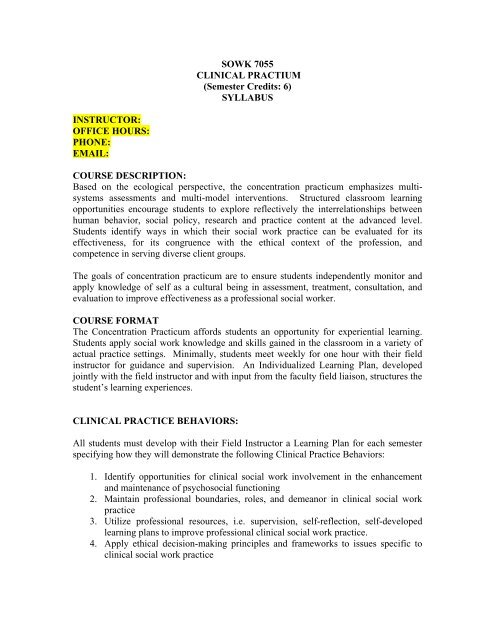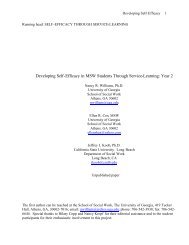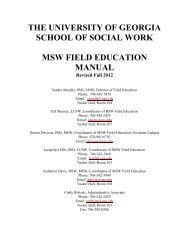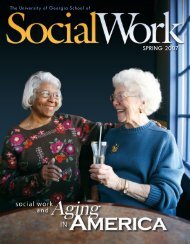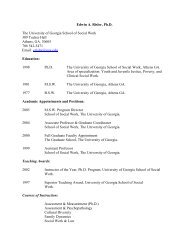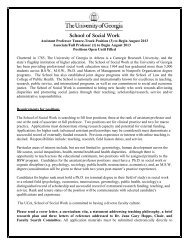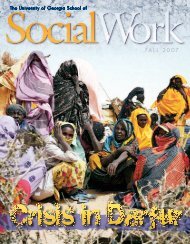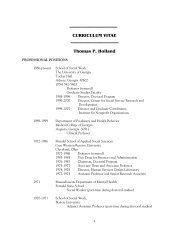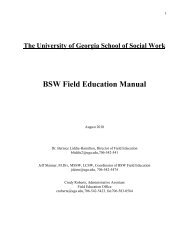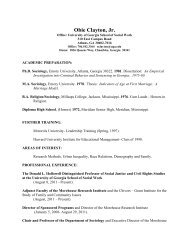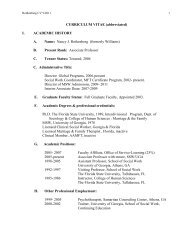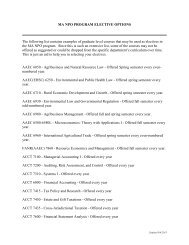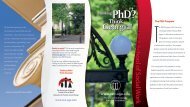SOWK 7055 Clinical Practicum Syllabus - University of Georgia ...
SOWK 7055 Clinical Practicum Syllabus - University of Georgia ...
SOWK 7055 Clinical Practicum Syllabus - University of Georgia ...
You also want an ePaper? Increase the reach of your titles
YUMPU automatically turns print PDFs into web optimized ePapers that Google loves.
<strong>SOWK</strong> <strong>7055</strong><br />
CLINICAL PRACTIUM<br />
(Semester Credits: 6)<br />
SYLLABUS<br />
INSTRUCTOR:<br />
OFFICE HOURS:<br />
PHONE:<br />
EMAIL:<br />
COURSE DESCRIPTION:<br />
Based on the ecological perspective, the concentration practicum emphasizes multisystems<br />
assessments and multi-model interventions. Structured classroom learning<br />
opportunities encourage students to explore reflectively the interrelationships between<br />
human behavior, social policy, research and practice content at the advanced level.<br />
Students identify ways in which their social work practice can be evaluated for its<br />
effectiveness, for its congruence with the ethical context <strong>of</strong> the pr<strong>of</strong>ession, and<br />
competence in serving diverse client groups.<br />
The goals <strong>of</strong> concentration practicum are to ensure students independently monitor and<br />
apply knowledge <strong>of</strong> self as a cultural being in assessment, treatment, consultation, and<br />
evaluation to improve effectiveness as a pr<strong>of</strong>essional social worker.<br />
COURSE FORMAT<br />
The Concentration <strong>Practicum</strong> affords students an opportunity for experiential learning.<br />
Students apply social work knowledge and skills gained in the classroom in a variety <strong>of</strong><br />
actual practice settings. Minimally, students meet weekly for one hour with their field<br />
instructor for guidance and supervision. An Individualized Learning Plan, developed<br />
jointly with the field instructor and with input from the faculty field liaison, structures the<br />
student’s learning experiences.<br />
CLINICAL PRACTICE BEHAVIORS:<br />
All students must develop with their Field Instructor a Learning Plan for each semester<br />
specifying how they will demonstrate the following <strong>Clinical</strong> Practice Behaviors:<br />
1. Identify opportunities for clinical social work involvement in the enhancement<br />
and maintenance <strong>of</strong> psychosocial functioning<br />
2. Maintain pr<strong>of</strong>essional boundaries, roles, and demeanor in clinical social work<br />
practice<br />
3. Utilize pr<strong>of</strong>essional resources, i.e. supervision, self-reflection, self-developed<br />
learning plans to improve pr<strong>of</strong>essional clinical social work practice.<br />
4. Apply ethical decision-making principles and frameworks to issues specific to<br />
clinical social work practice
5. Apply problem-solving techniques based on informed discernment within clinical<br />
social work practice<br />
6. Communicate effectively with a variety <strong>of</strong> stakeholders, i.e. diverse clientele and<br />
multi-disciplinary colleagues<br />
7. Identify and apply appropriate clinical social work models with diverse client<br />
populations for engagement, assessment, intervention, and evaluation<br />
8. Advocate on behalf <strong>of</strong> people to secure basic human rights, including the<br />
availability and accessibility <strong>of</strong> psychosocial services<br />
9. Educate and empower people to advocate on their own behalf for their basic<br />
human rights, including the availability and accessibility <strong>of</strong> psychosocial services<br />
10. Identify, select, and evaluate strategies for maintaining and enhancing<br />
psychosocial functioning<br />
11. Work collaboratively with evaluators/researchers to assess and improve<br />
intervention effectiveness<br />
12. Relate theories, models, and evidence-based knowledge to the maintenance and<br />
enhancement <strong>of</strong> people’s psychosocial functioning<br />
13. Apply policy practice skills, including education and advocacy to work with<br />
clients<br />
14. Adapt clinical social work practices in response to contextual events and<br />
advances in knowledge<br />
15. Utilize interpersonal and contracting skills to engage members <strong>of</strong> divers groups<br />
in interventions aimed toward increased psychosocial functioning<br />
16. Conduct a comprehensive biopsychosocial assessment <strong>of</strong> a client in the context<br />
<strong>of</strong> the clinical practice environment<br />
17. Use empathy and sensitive interviewing skills to facilitate clients’ identification<br />
<strong>of</strong> their strengths and problems<br />
18. Employ DSM-IV-TR to accurately assess and diagnose psychopathology<br />
19. Create an appropriate and mutually agreed upon treatment plan aimed at<br />
improving psychosocial needs identified through assessment<br />
20. Select and apply strategies aimed toward effective prevention <strong>of</strong> psychosocial<br />
dysfunction adapting them for relevance to target populations<br />
21. Select and apply effective clinical social work interventions to improve clients’<br />
psychosocial functioning<br />
22. Apply research skills to the evaluation <strong>of</strong> psychosocial interventions<br />
23. Communicate and disseminate evaluation results appropriate to the intended<br />
stakeholders<br />
REQUIRED TEXT<br />
No text is required. Based on the students’ individual learning needs and interests,<br />
reading materials may be required/suggested by the Faculty Field Liaison or the<br />
Field Instructor.
ASSIGNMENTS<br />
Learning Plan<br />
With input from the field instructor and assistance as needed from the Faculty Field<br />
Liaison, each student will develop an individualized Learning Plan that outlines<br />
tasks/activities the student will complete to demonstrate competency in each <strong>of</strong> the<br />
practice behaviors listed above. A template for the Learning Plan is located online.<br />
The Learning Plan also specifies outcomes and how outcomes will be<br />
evaluated/measured. The Learning Plan should be completed and submitted to<br />
the Faculty Field Liaison by the third week <strong>of</strong> each semester. The student should<br />
retain a copy for him/herself and provide a copy for the Field Instructor.<br />
In addition to the activities specified in the Learning Plan, the following assignments<br />
are required for all students. The purpose <strong>of</strong> the assignments is to allow the Faculty<br />
Field Liaison to evaluate the student’s performance on the associated practice<br />
behaviors. The Faculty Liaison and Field Instructor work together to avoid<br />
duplication and redundancy in assignments, yet assure that the practice behaviors are<br />
demonstrated.<br />
Required Assignments<br />
Fall Semester<br />
Assignment % <strong>of</strong> Due Location<br />
Final Date in Field<br />
Grade<br />
Manual<br />
Agency Community 10% Appendix<br />
Study<br />
C<br />
Process Recording 10% Appendix<br />
C<br />
Reflective Episode 5% Appendix<br />
C<br />
Associated<br />
Behaviors<br />
Practice<br />
#1, #2, #3, #7, #12,<br />
#13, #22<br />
#1, #2, #5, #6, #7, #9,<br />
#10, #12, #15 - #17,<br />
#20, #21<br />
#3, #4, #7, #5<br />
Spring Semester:<br />
Assignment % <strong>of</strong> Due Location<br />
Final Date in Field<br />
Grade<br />
Manual<br />
Biopsychosocial 10% Appendix<br />
Assessment<br />
C<br />
Process Recording 10% Appendix<br />
C<br />
Reflective Episode 5% Appendix<br />
C<br />
Associated<br />
Behaviors<br />
Practice<br />
#5, #7, #10, #12, #13,<br />
#14, #15 - #21<br />
#1, #2, #5, #6, #7, #9,<br />
#10, #12, #15 - #17,<br />
#20, #21<br />
#3, #4, #7, #5
Continuing<br />
Education/Pr<strong>of</strong>essional<br />
Growth Plan<br />
No Grade<br />
Appendix<br />
C<br />
#1, #3, #14<br />
Additional assignments for this course may be made at the discretion <strong>of</strong> each individual<br />
Faculty Liaison and Field Instructor.<br />
Penalty for Late Submission<br />
Determined by each faculty liaison.<br />
GRADES AND EVALUATION<br />
GRADES<br />
The concentration student’s letter grade for field education incorporates a suggested<br />
grade for field placement given by the Field Instructor and a grade given by the Faculty<br />
Liaison - 75% <strong>of</strong> the final grade is determined by the student’s performance in the field<br />
and 25% <strong>of</strong> the final grade is determined by the student’s performance on assignments<br />
given by the Faculty Liaison. Assigning and reporting the final grade is the responsibility<br />
<strong>of</strong> the Faculty Liaison. Although the final grade represents a 75/25 split between<br />
fieldwork and liaison assignments, the Faculty Liaison has the discretion to lower a<br />
student’s final grade for: (1) failure to submit the completed learning plan, assignments,<br />
or any additional course requirements on designated dates; (2) failure to complete any<br />
assignment or a course requirement; and (3) failure to complete the minimum <strong>of</strong> 360 field<br />
placement hours per semester for two consecutive semesters.<br />
MSW students must earn a “B” or better in the first semester practicum in order to<br />
continue on to second semester practicum. Students who fall below the minimum<br />
standards set forth by the School <strong>of</strong> Social Work may be subject to an academic review.<br />
If a student receives a grade <strong>of</strong> less than a “B”, they must repeat concentration practicum<br />
as determined by M.S.W. program policy (page 13 and appendix J).<br />
An “I” (incomplete) may be granted to a student with extenuating circumstances other<br />
than performance, as approved by the Faculty Liaison. A student who is failing field<br />
education may not receive an “I” grade.<br />
FIELD INSTRUCTOR’S EVALUATION OF STUDENT<br />
Evaluation <strong>of</strong> the student is an on-going process. A student continually receives feedback<br />
on his/her performance from the Field Instructor, task supervisor (where appropriate),<br />
and assigned Faculty Liaison.<br />
SITE VISITS BY FACUTY LIAISON<br />
The Faculty Liaison will make an on site visit with the Field Instructor and student<br />
around the fourth week <strong>of</strong> the first semester to review the learning plan and discuss the<br />
student’s initial progress. There is no written evaluation required for the first visit.
A second site visit will be made by the faculty liaison around the fourteenth week <strong>of</strong> the<br />
semester to: (1) Review with the student and the field instructor the student’s progress<br />
toward all learning objectives/demonstration <strong>of</strong> practice behaviors; (2) provide the<br />
student with feedback regarding strengths and areas <strong>of</strong> performance that require<br />
improvement; (3) discuss the student’s final grade for the semester; and (4) discuss<br />
modification in the student’s learning plan for the second semester.<br />
Field Instructors are required to complete a written final evaluation at the end <strong>of</strong> each<br />
semester (forms provided in this appendix). The Field Instructor is responsible for<br />
completing each written evaluation in a timely manner, discussing the completed<br />
instrument with the student and obtaining the student’s signature on the final page. It is<br />
the student’s responsibility to inform the Field Instructor <strong>of</strong> the due dates listed in their<br />
practicum course syllabus. The Faculty Liaison is responsible for contacting the Field<br />
Instructor for a final on-site evaluation with the student and Field Instructor to review the<br />
written evaluation.<br />
The Field Instructor is asked to suggest a grade for the student on field<br />
performance as part <strong>of</strong> the end-<strong>of</strong>-semester final evaluation. The Field<br />
Instructor’s grade accounts for 75% <strong>of</strong> the overall grade for the semester.<br />
A 90-100 superior work (4.0) C+ 74-76 average (2.3)<br />
A- 87-89 excellent work (3.7) C 70-73 below average (2.0)<br />
B+ 84-86 good work (3.3) C- 67-69 passing (1.7)<br />
B 80-83 well above average (3.0) D 60-66 minimally passing<br />
(1.0)<br />
B- 77-79 above average (2.7) F Less than 59 failing (0.0)<br />
FACULTY LIAISON’S EVALUATION OF STUDEN<br />
The Faculty Liaison is responsible for assigning the grade earned by the student. This<br />
grade takes into consideration the Field Instructor’s evaluation (75%) and the Faculty<br />
Liaison’s evaluation on student’s performance on assignments (25%).<br />
RECOMMENDED ADDITIONAL READINGS<br />
Boyle, S.W., Hull, G.H., Mather, J.H., Smith, L.L., & Farley, O.W. (2006). Direct<br />
practice in social work. NY: Pearson Education, Inc.<br />
Corcoran, J. (2005). Building strengths and skills: A collaborative approach to working<br />
with clients. Oxford: <strong>University</strong> Press.<br />
Thomlison, B., & Corcoran, K. (eds.) (2008). The evidence-based internship: A field<br />
manual. NY: Oxford <strong>University</strong> Press.<br />
ADA Statement<br />
In accordance with the Americans with Disabilities Act (1990), the <strong>University</strong> <strong>of</strong> <strong>Georgia</strong>,<br />
School <strong>of</strong> Social Work seeks to provide equal access to individuals with disabilities.<br />
Students who have a disability and need specific accommodations and support to
facilitate full inclusion <strong>of</strong> all aspects <strong>of</strong> the course should make an appointment with the<br />
instructor during the first week <strong>of</strong> the term. To register for services, students may contact<br />
Disability Services located at Clark Howell Hall (706-542-8719, TTY 706-542-8778,<br />
www.dissvcs.uga.edu).<br />
Academic Honesty<br />
All academic work must meet the standards contained in “A Culture <strong>of</strong> Honesty.”<br />
Students are responsible for informing themselves about those standards before<br />
performing any academic work. The link to more detailed information about academic<br />
honesty can be found at: http://www.uga.edu/ovpi/honesty/acadhon.htm<br />
Ethics and Confidentiality<br />
The NASW Code <strong>of</strong> Ethics is intended to serve as a guide to the everyday pr<strong>of</strong>essional<br />
conduct <strong>of</strong> social workers. You are expected to be familiar with its contents. The Code<br />
can be found online at: http://www.socialworkers.org/pubs/code.asp.<br />
Please Note: The course syllabus is a general plan for the course; deviations announced<br />
to the class by the instructor may be necessary.


